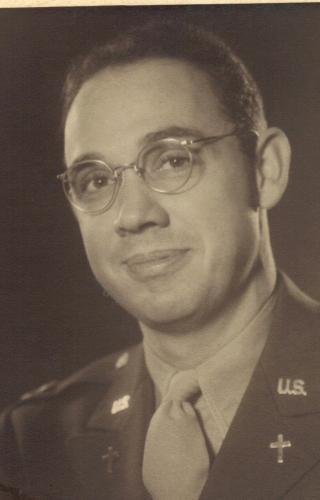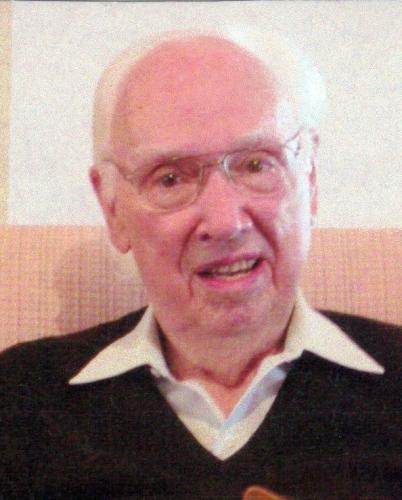Veteran Charles C. Cowsert
Charles C. Cowsert
On a beautiful fall day in October of 1915, Charles C. Cowsert was born on a farm near Columbia, Tennessee. Charles was the youngest child in his family of six which consisted of his parents, two boys, and two girls. He attended a two room school and did well. When he graduated from the eighth grade he was named valedictorian of his class. However, Charles quickly points out that there were only two members in the class!
Early in life Charles learned the value of hard work. On Saturdays he worked in a grocery store for 10 cents an hour. He soon had a savings account of 20 dollars, but when a run on the bank occurred during the Great Depression he was able to withdraw his money. A Tennessee Walking Horse provided him with transportation to and from school and work. These horses with their spirited gait later became famous across the country and were often seen at horse shows in Virginia and elsewhere.

Life on the Tennessee farm was a wonderful time for young Charles. The family would gather by the fireplace during the winter evenings and on the front porch during the summer. While days were marked by hard work, some chores, such as milking cows, tending lambs, and gathering eggs are remembered fondly. There was ample time for family gatherings where card and board games were played. The weeks were marked by church services, Sunday school, church socials and picnics. Charles recalls that he enjoyed as a child preaching to the chickens which may have foreshadowed his later call to the ministry.
During those early years at home, many people influence his attitude toward life. The family observed rest periods on Sunday afternoons and his mother read from the Christian Observer. An elementary school teacher encouraged Charles to read books and to enter county competitive subject area tests where he frequently won blue and red ribbons. A Sunday school teacher who taught a class for twelve year olds was an important influence. Then as a graduating high school senior he won an award of 100 dollars as the most deserving student in a class of 100 students. After high school Charles taught school for a year and his success in that endeavor confirmed for him his belief that he should become a minister. All of these individuals and events helped to shape the character and values of the young Tennessee farm boy.
In 1933, Charles entered King College in Bristol, Tennessee and graduated in 1937. Following college he attended Union Theological Seminary in Richmond, Virginia and was ordained as a minister in the Presbytery Church U. S. in June of 1942. While ordained ministers and theological students were exempted from conscription, two major factors caused Charles to volunteer for the chaplaincy. This action was motivated by his desire to serve both his country and his peers who were already in military service. Also, the Presbyterian Church was asking ministers to volunteer for service as chaplains. After entering the U. S. Army, Charles was enrolled in chaplain’s school at Harvard University.
His military career spanned 26 months. After service in the United States, he served in the European Theater and in occupied Germany briefly after the end of the war in Europe. Charles was awarded three Battle Stars; one each for service in the Rhineland, in the Ardennes (Battle of the Bulge), and in Central Europe. During his military career he served primarily with the 84th Infantry Division, but fulfilled short assignments with the 29th Infantry Division, and the 78th Infantry Division.
His duties as a chaplain included planning and conducting regular worship services, conducting wedding and funerals, and assisting with various military functions. Another very important responsibility was serving as a liaison between the military and the home front. This involved writing condolence letters to parents and spouses of soldiers killed in action. Also Charles assisted the military in resolving various personal problems of soldiers under his care. Charles was honorably discharged from the U. S. Army on 7 June 1946 with the rank of Captain. He then enlisted in the U. S. Army Reserves, served for an additional five years, and resigned with the rank of Major in 1953.
He conducted a service and preached a sermon on V.E. Day in Wittenberg Church where Martin Luther had posted his 95 Theses which proclaimed the beginning of the Protestant Reformation. Many men made professions of faith and established, with Charles’ help membership in U. S. churches. Many of these men became close personal friends. Following the end of the European War, Charles helped to negotiate a meeting between 12 American soldiers and a group of German Christian youth. The German youth were surprised by the spirit of forgiveness displayed by the American soldiers and were encouraged by the hope that this spirit offered for the future. Charles was awarded the Purple Heart for injuries he received while under German fire.

These experiences expanded his knowledge of the world and showed the extreme depth of both good and evil in humanity. His theological views were sharpened and his education was enhanced. Charles’ understanding of the military community grew and helped him later serve a church in Alexandria which contained many military families.
Following his military service Charles served for twenty years congregations in the Presbyterian Church in the United States (PCUS). He then served another twenty years in other posts in his denomination. He served as Executive Presbyter for Winchester Presbytery and was Secretary of Stewardship for the PCUS. Charles also was Associate Director and Treasurer for the Presbyterian Foundation and Executive Secretary of the Board of Annuities and Relief which provided pensions, medical insurance and relief to ministers and other church workers.
Charles married Ann McCorkle and the couple had two children. The first child, a daughter was born during the Battle of the Bulge. Ann passed away on December 22, 2003.
As he reflects on all of his life experiences during the tenth decade of his life, the Reverend Cowsert concludes that it is important for young people to learn how to think for themselves and to question assumptions. Also, he believes that wars are futile means for solving the world’s problems. Finally, he believes that they must recognize their need to know and trust God.
As told to Bill Blair